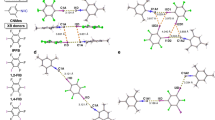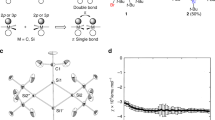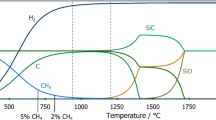Abstract
SILICON tetrachloride forms 1 : 4, 1 : 2 and 1 : 1 addition compounds with amines. Only one monoaminate has been identified (silicon tetrachloride: dimethylaniline); but the tetraminates and the diaminates are general occurrences when amines (butylamine, diethylamine, triethylamine, tributylamine, piperidine, pyridine, dimethylaniline, aniline) are mixed with silicon tetrachloride. The addition compounds appear immediately as fine-grained insoluble precipitates; when dried, they are powders. They can be prepared independently of one another by controlling the concentrations of the reactants. The white tetraminates are chemically less reactive and thermally more stable than the coloured diaminates. The tetraminates begin to decompose at temperatures above and below 100° C. A complete report is being published in the Canadian Journal of Chemistry.
This is a preview of subscription content, access via your institution
Access options
Subscribe to this journal
Receive 51 print issues and online access
$199.00 per year
only $3.90 per issue
Buy this article
- Purchase on Springer Link
- Instant access to full article PDF
Prices may be subject to local taxes which are calculated during checkout
Similar content being viewed by others
Author information
Authors and Affiliations
Rights and permissions
About this article
Cite this article
TROST, W. Addition Compounds of Silicon Tetrachloride. Nature 169, 289–290 (1952). https://doi.org/10.1038/169289a0
Issue Date:
DOI: https://doi.org/10.1038/169289a0
Comments
By submitting a comment you agree to abide by our Terms and Community Guidelines. If you find something abusive or that does not comply with our terms or guidelines please flag it as inappropriate.



